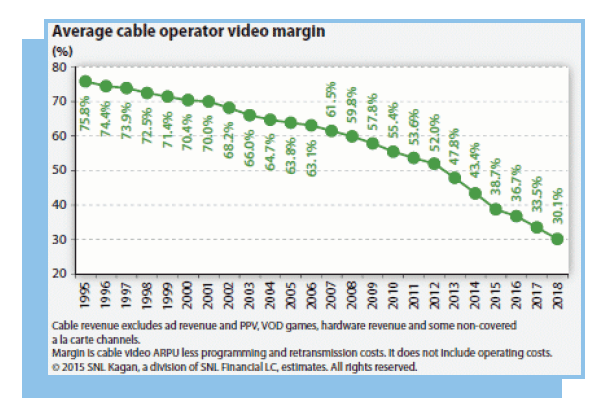 The deck is stacked against independent cable operators fighting to stay competitive in a marketplace obsessed with consolidation and volume discounts on cable programming. The excessive costs paid by small, often family owned cable operators have now become so great, they are impeding broadband upgrades and expansion, according to the American Cable Association.
The deck is stacked against independent cable operators fighting to stay competitive in a marketplace obsessed with consolidation and volume discounts on cable programming. The excessive costs paid by small, often family owned cable operators have now become so great, they are impeding broadband upgrades and expansion, according to the American Cable Association.
The ACA represents small and medium cable operators that live in a different world than Comcast and Time Warner Cable. For years, these smaller, usually rural operators have been at a disadvantage negotiating with cable programmers for reasonable programming rates. The largest cable operators win the best volume discounts, often offset by higher rates for the smaller cable companies that are typical of ACA’s membership roster.
With the FCC now enforcing Section 706 of its mandate requiring the Commission to advance the cause of competitive and ubiquitous broadband, the ACA has gotten creative in comments urging the FCC to crack down on the kinds of unfair programming contracts that force small operators to spend an ever-increasing amount of their budgets on cable television networks instead of broadband expansion.

Video margins are dropping, which means smaller operators have less to invest in broadband. (Chart: SNL/Kagan)
“It has become evident that the increasing prices video programmers and broadcasters charge multichannel video programming distributors (MVPDs) can act as a drag on broadband deployment,” said ACA president Matt Polka. “If these prices continue their upward spiral, existing providers of both broadband and MVPD services and new entrants will be deterred from expanding their broadband networks or otherwise undertaking new builds.”
Removing barriers to investment is one of the requirements the FCC is supposed to enforce under Section 706 and it has recently shown a willingness to do that by overturning Tennessee and North Carolina laws restricting the growth of municipal broadband. The ACA now wants to learn if the FCC will give small cable operators some relief as well.
The ACA argues that broadband providers must offer consumers video along with broadband and voice services, yet they face ever-increasing video programming costs that squeeze margins. As a result, smaller triple play providers’ ability to achieve a sufficient return on investment for deploying broadband, particularly in new areas, is quickly diminishing.
The trade group wants the FCC to reform program-access rules to guarantee fairer treatment for smaller cable operators who depend on group buying power through buying co-ops like the National Cable Television Cooperative. The ACA also wants a prohibition on programmers yanking their signals in the middle of retransmission consent contract negotiations. The ability to pull a signal off a cable system gives programmers an unfair negotiating advantage according to the ACA.


 Subscribe
Subscribe
This also means that the smaller ACA cable operators may have to become the new video pioneers for OTT, since they have to pay so much more for TV programming(per subcriber) than the bigger MSO’s.
Yes, the ACA should explore working together to 1) Force the big cable programmers to give ACA members more reasonable programming charges. —-OR—- 2) Tell the big programmers that they will begin dropping traditional cable TV packages and they will facilitate OTT streaming packages for sale to their ACA video customers.